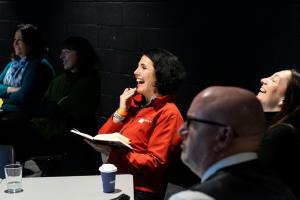Latest Blogs
-
 24 April 2023
24 April 2023The crisis-filled clouds do have a silver lining
-
 27 October 2022
27 October 2022Wisdom Labs Update
-
 12 July 2022
12 July 2022Surviving Tough Times by Investing in the Future
-
22 April 2022
Creating a competitive environment
-
 19 January 2022
19 January 2022The end of Groundhog Day – what should businesses do next?
-
 20 September 2021
20 September 2021“Should I stay or should I go now?” Work from home or return to the office?
-
 9 August 2021
9 August 2021Discovering the Known Unknowns? Assessing if UK Financial Regulation has Improved since the Great Financial Crisis
